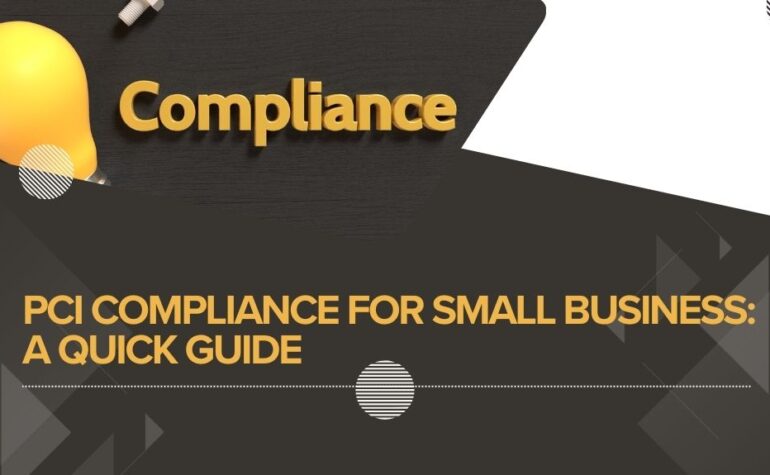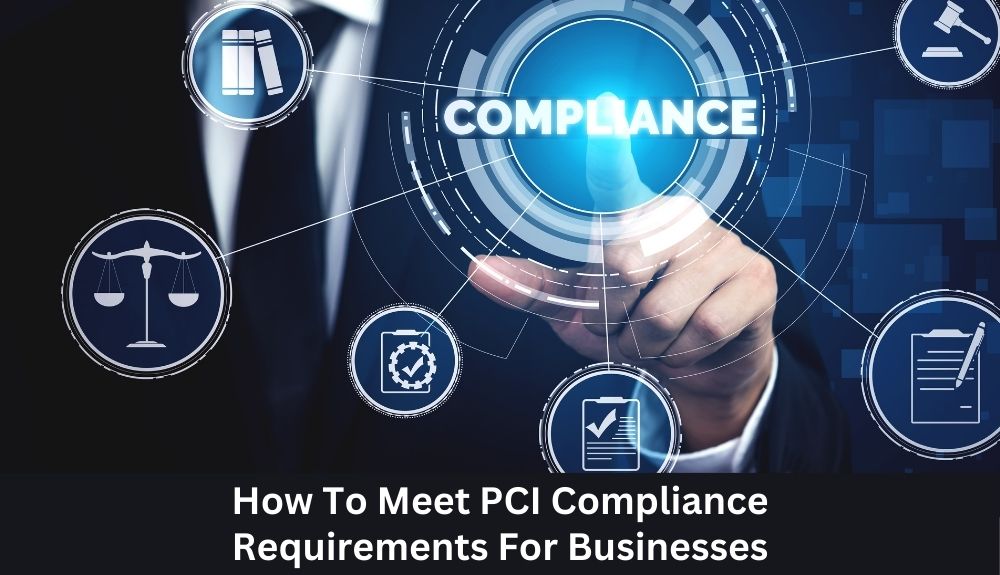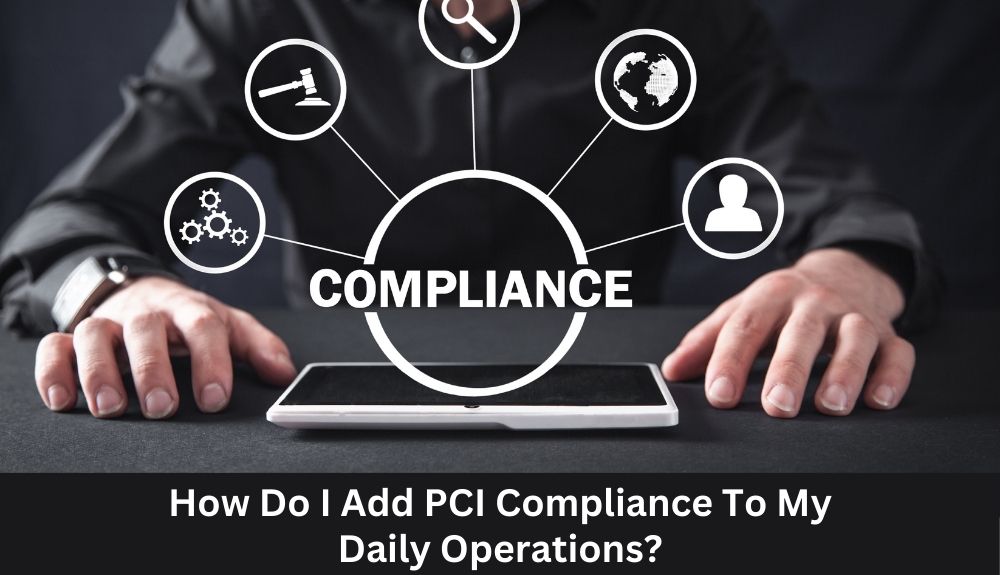Best Credit Card Processing Solutions Tailored for Every Industry

By merchantservices February 15, 2024
Is your small business handling payment card transactions? If so, you must be aware of the importance of PCI compliance. The Payment Card Industry Data Security Standard (PCI DSS) is a set of security standards that every business processing credit card information must adhere to in order to protect customer data from potential breaches.
Non-compliance can lead to severe consequences, including hefty fines and loss of customer trust. But don’t worry, our comprehensive guide is here to help you understand and meet the necessary requirements for achieving and maintaining PCI compliance.
In this quick guide, we will provide you with essential information, step-by-step instructions, and valuable tips to ensure the security of cardholder data in your small business. You’ll discover everything you need to know about PCI compliance, from the basics to the self-assessment questionnaire and the different levels of compliance.
We’ll also discuss the importance of maintaining PCI compliance, the risks associated with non-compliance, and best practices to help you protect your business and customers. Don’t let your small business become a target for data breaches. Read on to learn how to achieve and maintain PCI compliance effectively.
PCI Compliance Requirements For Small Businesses: Your Guide
Small businesses that handle payment card transactions must adhere to specific requirements to achieve and maintain PCI compliance. Understanding and implementing these requirements is crucial for the security of cardholder data. Here are the essential requirements for PCI compliance that small businesses need to follow:
1. Maintain a Secure Network: Ensure that your business has robust firewall protection and secure network configurations. Regularly update and patch system vulnerabilities to prevent unauthorized access to cardholder data.
2. Protect Cardholder Data: Implement strong encryption and tokenization methods to safeguard sensitive cardholder data during storage and transmission. Limit access to cardholder data to only authorized personnel.
3. Regularly Monitor and Test Networks: Continuously monitor your network for potential security breaches and promptly address any vulnerabilities. Conduct regular security assessments and penetration testing to identify gaps and weaknesses.
4. Implement Strong Access Control Measures: Restrict access to cardholder data based on a need-to-know basis. Assign unique IDs to each person with computer access and regularly review access privileges.
5. Maintain an Information Security Policy: Develop and document an information security policy that addresses all aspects of PCI compliance. Communicate the policy to employees and ensure their understanding and adherence.
By adhering to these requirements, small businesses can enhance the security of their payment card transactions and protect cardholder data effectively.
Remember, achieving and maintaining PCI compliance is an ongoing process. Regularly review and update your practices to stay aligned with the ever-evolving PCI DSS standards and industry best practices. Protecting cardholder data is not only essential for complying with regulations but also for maintaining the trust and confidence of your customers.
What Are PCI Compliance Requirements?
As a small business, achieving PCI compliance is essential to ensure the security of cardholder data. To meet PCI compliance requirements, businesses must adhere to specific guidelines and implement necessary measures. Here are some key requirements to focus on:
1. Maintain a Secure Network
– Install and maintain a robust firewall to protect cardholder data.
– Use unique IDs and strong passwords to restrict access to the network.
– Regularly update and patch security systems to fix any vulnerabilities.
2. Protect Cardholder Data
– Use encryption when transmitting cardholder data across public networks.
– Ensure sensitive data storage is secure and limited to necessity.
– Implement access control measures to restrict the number of employees who can access cardholder data.
3. Regularly Monitor and Test Networks
– Implement proactive measures like intrusion detection systems to monitor network security.
– Conduct regular vulnerability scans and penetration tests to identify and address potential weaknesses.
4. Maintain an Information Security Policy
– Develop and maintain a comprehensive security policy that addresses PCI compliance requirements.
– Regularly update and communicate the policy to all employees to ensure adherence.
By following these requirements, businesses can protect cardholder data and maintain PCI compliance. However, it’s essential to note that the specific requirements may vary based on the size of the business and the volume of transactions. So, it’s crucial to understand the appropriate compliance level for your business and consult experts if needed.
Remember, achieving PCI compliance not only safeguards sensitive information but also enhances customer trust, reduces the risk of data breaches, and demonstrates your commitment to maintaining a secure payment environment.
What Are The 4 Compliance Levels?
PCI compliance is not a one-size-fits-all approach. The Payment Card Industry Data Security Standard (PCI DSS) recognizes four compliance levels based on the annual transaction volume of a business. Each level has its own requirements and validation processes. Understanding these levels is crucial for small businesses to determine their specific compliance needs.
Level 1: This level applies to businesses that process over 6 million transactions per year or have experienced a data breach. These businesses face the most stringent requirements and must undergo an annual onsite assessment conducted by a qualified security assessor (QSA).
Level 2: Small businesses that process between 1 million and 6 million transactions annually fall into this level. They are required to complete an annual self-assessment questionnaire (SAQ) and quarterly network scans by an approved scanning vendor (ASV).
Level 3: Businesses processing between 20,000 and 1 million e-commerce transactions per year are categorized under level 3. They must complete an SAQ and conduct quarterly ASV scans.
Level 4: This level is for businesses processing less than 20,000 e-commerce transactions or up to 1 million non-e-commerce transactions annually. They need to complete a simplified version of the SAQ and perform quarterly ASV scans.
Determining the appropriate compliance level is vital for businesses to allocate resources properly and ensure they meet the necessary security measures. By understanding the four compliance levels, small businesses can ascertain their specific requirements and work towards achieving PCI compliance effectively.
Remember, maintaining PCI compliance is an ongoing process that necessitates regular evaluations, updates, and adherence to the latest security standards.
How To Meet PCI Compliance Requirements For Businesses

Achieving and maintaining PCI compliance is crucial for any business that handles payment card transactions. By meeting the necessary requirements, businesses can ensure the security of cardholder data and establish trust with their customers. Here are some actionable tips and strategies to help businesses meet all the necessary PCI compliance requirements:
1. Conduct Regular Security Assessments
Regularly assessing the security of your systems and processes is essential for maintaining PCI compliance. This involves identifying and addressing any vulnerabilities or weaknesses that could potentially compromise cardholder data. It’s recommended to conduct both internal and external security assessments, including vulnerability scans and penetration tests. By staying proactive and addressing security issues promptly, businesses can reduce the risk of data breaches and maintain compliance.
2. Stay Up-to-Date with PCI DSS Standards
The Payment Card Industry Data Security Standard (PCI DSS) is a set of security standards that businesses must adhere to for PCI compliance. It’s important to stay informed about the latest updates and changes to the PCI DSS requirements. Regularly review these standards and ensure that your business is implementing the necessary security controls and safeguards. By staying up-to-date with PCI DSS standards, you can align your practices with industry best practices and maintain compliance.
3. Implement Strong Access Control Measures
Controlling access to cardholder data is a critical component of PCI compliance. Implement strong access control measures such as unique user IDs, role-based access controls, and strong passwords. Restrict access to cardholder data on a “need-to-know” basis, ensuring that only authorized individuals have access to sensitive information. Regularly review user access privileges and revoke access for individuals who no longer require it. By implementing robust access controls, businesses can protect cardholder data and meet compliance requirements.
4. Regularly Monitor and Test the Network
Ongoing monitoring and testing of your network are essential for maintaining PCI compliance. Implement a robust network monitoring system that detects and alerts you to any suspicious activity or potential security breaches. Regularly review logs and reports for any signs of unauthorized access or anomalies. Conduct regular penetration testing to identify potential vulnerabilities in your systems and address them promptly. By continuously monitoring and testing your network, you can effectively mitigate threats and maintain compliance.
Remember, achieving and maintaining PCI compliance is an ongoing process. By following these tips and strategies, businesses can ensure they meet all the necessary requirements and protect cardholder data effectively. Stay proactive and prioritize the security of payment card transactions to build trust with your customers and safeguard your business’s reputation.
Compliance requirements
To achieve and maintain PCI compliance, small businesses need to meet specific requirements designed to safeguard cardholder data and protect against security breaches. These compliance requirements encompass various aspects of data security and network protection.
1. Implementing strong access control measures: Small businesses must establish secure systems and processes to control and limit access to sensitive cardholder data. This involves implementing unique user IDs, strong passwords, and restricted access based on job roles.
2. Regularly monitoring and testing the network: Continuous monitoring and periodic testing are necessary to identify and address vulnerabilities in the network. Small businesses should conduct regular scans for malware, utilize intrusion detection systems, and perform penetration testing to assess their network security.
3. Maintaining secure systems and applications: Businesses should ensure that their systems and applications are up-to-date with security patches and regularly patched against vulnerabilities. This helps minimize the risk of exploitation by potential attackers.
4. Protecting stored cardholder data: It is essential for small businesses to securely store cardholder data by utilizing strong encryption techniques. Encryption adds an additional layer of protection to sensitive information, making it unreadable to unauthorized persons.
5. Implementing routine security awareness training: Small businesses should train their employees on proper security practices and provide ongoing education about the importance of protecting sensitive cardholder data. Awareness of security best practices can help mitigate the risk of human error and prevent potential breaches.
By understanding and adhering to these compliance requirements, small businesses can maintain the security and trust of their customers’ cardholder data, reducing the risk of data breaches and potential financial penalties.
Self-Assessment Questionnaire (SAQ)
Completing the self-assessment questionnaire (SAQ) is a critical step for businesses aiming to achieve and maintain PCI compliance. This assessment allows businesses to evaluate their security measures and identify any potential vulnerabilities in their systems. By thoroughly examining their processes and infrastructure, businesses can ensure they are effectively protecting cardholder data.
The SAQ serves as a valuable tool for businesses to assess their security controls and validate their adherence to the Payment Card Industry Data Security Standard (PCI DSS). It helps identify areas that may require improvement and ensures that businesses are meeting the necessary compliance requirements.
During the self-assessment process, businesses answer a series of questions that cover various aspects of their payment processing environment, including network security, access controls, and internal policies. The SAQ provides guidance on the specific requirements for each question, helping businesses understand how they align with PCI DSS standards.
By completing the SAQ, businesses can gain valuable insights into their security posture and make necessary adjustments to enhance their overall protection of cardholder data. It allows them to proactively identify vulnerabilities and take appropriate measures to mitigate any risks. Moreover, successfully completing the SAQ demonstrates a commitment to maintaining a secure environment for payment card transactions.
In conclusion, the completion of the self-assessment questionnaire is a fundamental step towards achieving PCI compliance. It enables businesses to evaluate their security measures, identify vulnerabilities, and take necessary actions to protect cardholder data effectively. By adhering to the PCI DSS standards and regularly reassessing their security controls, businesses can maintain a secure payment processing environment and instill trust among their customers.
How Do I Add PCI Compliance To My Daily Operations?

To ensure PCI compliance becomes an integral part of your daily business operations, it’s crucial to follow these practical guidelines:
1. Train Employees on Secure Payment Processing
Educate your staff on the importance of secure payment processing and the potential risks associated with mishandling cardholder data. Train them on how to handle credit card information securely, including:
– Encrypting sensitive data during transmission
– Avoiding storing sensitive data unnecessarily
– Regularly updating passwords and access controls
2. Maintain Compliance Documentation
Establish a system for documenting and maintaining PCI compliance-related activities. This documentation should include:
– Policies and procedures for handling payment card transactions
– Records of employee training on payment card security
– Incident response plans in case of a data breach
– Evidence of regular security assessments and vulnerability scanning
3. Regularly Monitor and Assess Compliance
Continuously monitor your business’s adherence to PCI compliance requirements. This involves:
– Conducting periodic internal audits to ensure compliance
– Engaging qualified security assessors (QSAs) to perform annual audits
– Implementing strong access control measures to restrict system access
4. Collaborate with Service Providers
If you work with third-party service providers for payment processing, ensure they are also PCI compliant. Regularly review their compliance status and obtain a written agreement confirming their adherence. This partnership helps maintain the security of your customers’ cardholder data.
By integrating these practices into your daily business operations, you can establish a strong foundation for maintaining PCI compliance and safeguarding cardholder data.
Learn More About PCI Compliance With PaySimple
As a small business owner, achieving and maintaining PCI compliance is crucial for the security of your customers’ payment card data. PaySimple is here to assist you every step of the way, offering a range of benefits and services to ensure your business meets the necessary requirements.
With PaySimple, you’ll have access to expert guidance and resources to help you navigate the complexities of PCI compliance. Our team of professionals understands the unique challenges faced by small businesses and can provide personalized assistance tailored to your specific needs.
By partnering with PaySimple, you can enjoy the following benefits:
1. Comprehensive Payment Processing Solution: Our platform enables you to accept credit card payments seamlessly and securely, while ensuring PCI compliance at every step.
2. Security and Data Protection: We implement robust security measures to safeguard your customers’ cardholder data and protect you from potential data breaches.
3. PCI Compliance Assistance: Our team will guide you through the process of achieving and maintaining PCI compliance, offering valuable insights and best practices along the way.
4. Training and Support: We provide training resources and ongoing support to help you and your staff understand and implement secure payment processing practices.
Don’t let the complexities of PCI compliance overwhelm you. Start a 14-day free trial with PaySimple today and experience the peace of mind that comes with a comprehensive, PCI-compliant payment processing solution.
Start a 14-day Free Trial to accept credit cards seamlessly and securely with PaySimple
Are you a small business looking for a payment processing solution that ensures PCI compliance? Look no further than PaySimple. With PaySimple’s 14-day free trial, you can experience their comprehensive payment processing solution and accept credit cards seamlessly and securely.
Why choose PaySimple? Here are some key benefits:
1. PCI Compliance: PaySimple understands the importance of maintaining PCI compliance. Their platform is built with robust security measures to protect your customers’ cardholder data, giving you peace of mind.
2. Easy Integration: PaySimple seamlessly integrates with your existing systems and tools, allowing you to streamline your operations and enhance efficiency. You can accept credit card payments online, in-person, or via mobile devices, making it convenient for your customers.
3. Reliable Support: PaySimple provides exceptional customer support every step of the way. Their knowledgeable team is ready to assist you with any questions or concerns you may have, ensuring a smooth experience.
4. Comprehensive Solution: PaySimple offers a range of features to help you manage your payment processing effectively. From recurring billing and invoicing to reporting and analytics, you’ll have all the tools you need to run your business smoothly.
Don’t miss out on this opportunity to experience PaySimple’s payment processing solution and ensure PCI compliance for your small business. Sign up for their 14-day free trial now and take your payment operations to the next level.
Remember, securing cardholder data and maintaining PCI compliance is crucial for the success and reputation of your business. With PaySimple, you can achieve compliance while providing a smooth and secure payment experience for your customers.
